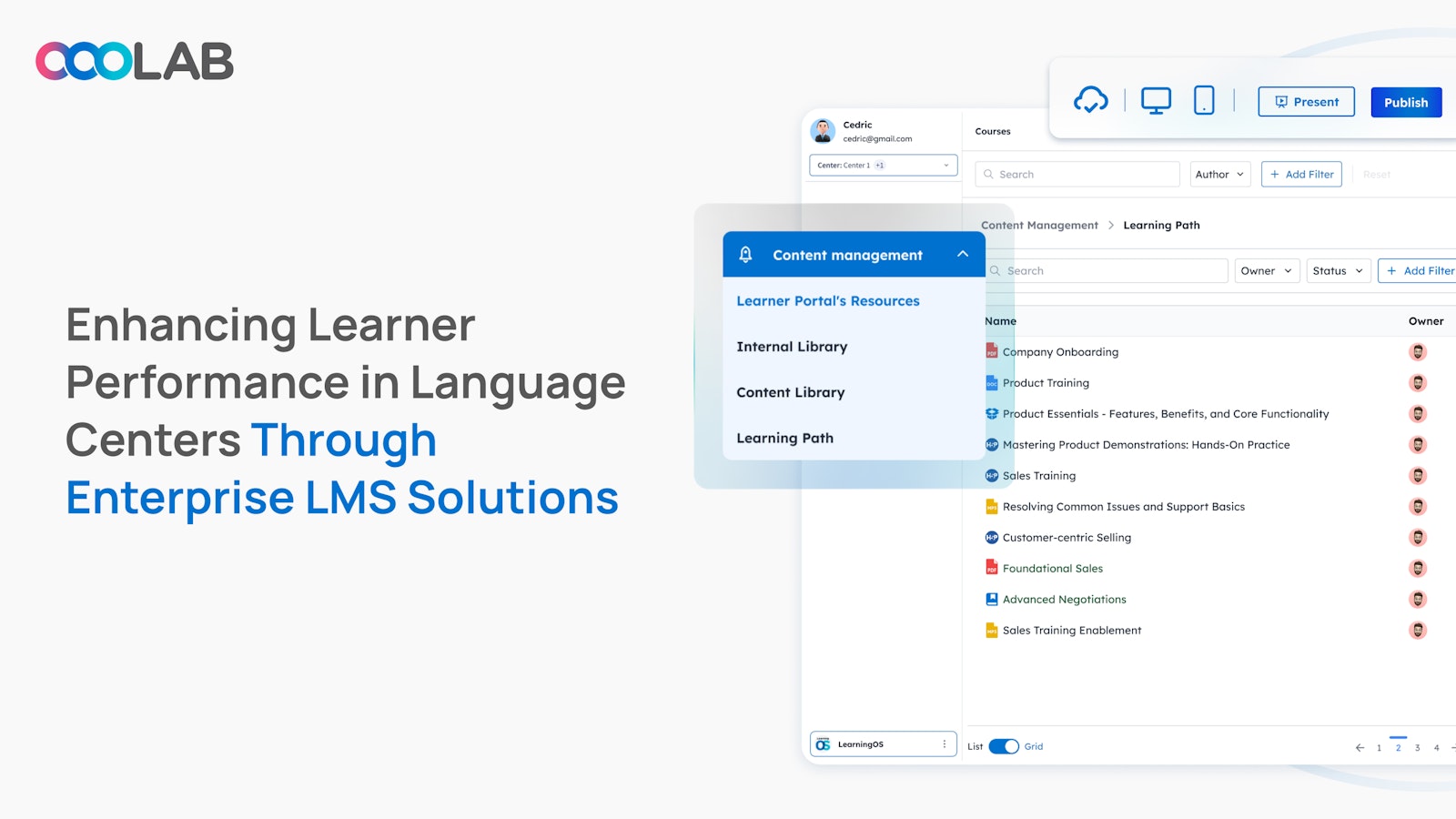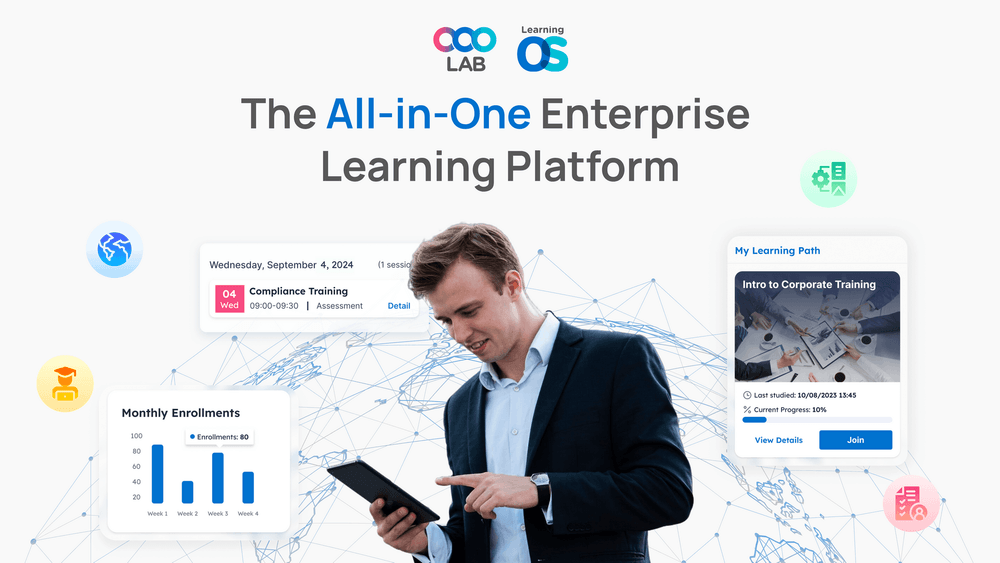

In today's fast-paced and interconnected world, language skills are more important than ever. As globalization continues to shape our personal and professional lives, the demand for effective language training is on the rise. Language centers play a crucial role in meeting this demand, providing learners with the necessary skills to communicate across cultures and borders. However, the traditional methods of language instruction are being increasingly complemented and, in some cases, replaced by innovative technological solutions. Among these, Enterprise Learning Management Systems (LMS) stand out as a powerful tool to enhance learner performance in language centers.

An Enterprise Learning Management System (LMS) is a software application designed to deliver, manage, and track educational courses or training programs. While initially developed for corporate training, the versatility of LMS platforms has made them invaluable in educational settings, including language centers. These systems offer a centralized platform for both instructors and learners, streamlining the learning process and providing various tools to facilitate effective education.
Enterprise LMS platforms come equipped with a range of features that make them particularly suited for language education. Some of the key features include:
Personalized Learning Paths:Enterprise LMS allows for the creation of customized learning paths tailored to the needs of individual learners. This personalization ensures that learners can progress at their own pace, focusing on areas where they need the most improvement.
Interactive Content Delivery: Language learning is inherently interactive, and modern LMS platforms support multimedia content, including videos, audio recordings, and interactive quizzes. These tools make the learning experience more engaging and effective.
Assessment and Feedback: Continuous assessment is vital in language learning. Enterprise LMS platforms provide tools for regular quizzes, assignments, and assessments. Instant feedback mechanisms help learners understand their progress and areas needing improvement.
Collaboration Tools: Language learning thrives on interaction. LMS platforms offer forums, chat rooms, and group projects that encourage peer-to-peer learning and practice, essential for language acquisition.
Mobile Accessibility: With the rise of mobile learning, enterprise LMS platforms are designed to be accessible on various devices, allowing learners to engage with course material anytime, anywhere. This flexibility is particularly beneficial for language learners who may need to practice consistently.
>>> Read more: Training Options for Administrators and Users: Optimizing LMS Effectiveness
>>> Read more: Customization Options for Enterprise LMS: Tailoring Learning to Fit Your Organization's Needs
The integration of Enterprise LMS in language centers brings a host of benefits that significantly enhance learner performance. Some of these benefits include:
Scalability and Reach: Enterprise LMS allows language centers to reach a larger audience beyond geographical limitations. Online courses can be accessed by learners worldwide, making language education more inclusive and accessible.
Enhanced Engagement: The interactive and multimedia capabilities of LMS platforms increase learner engagement. Engaged learners are more likely to retain information and achieve better outcomes.
Data-Driven Insights: LMS platforms collect data on learner performance, providing valuable insights into learning patterns and outcomes. Language centers can use this data to refine their teaching methods and better support learners.
Consistency in Training: With LMS, language centers can ensure consistent delivery of course material. This consistency is crucial in maintaining the quality of education and ensuring that all learners receive the same level of instruction.
Cost-Effectiveness: By reducing the need for physical classrooms and printed materials, LMS platforms lower the operational costs for language centers. Additionally, they allow for more efficient use of instructor time, as many administrative tasks are automated.
Ni Hao Ma Mandarin Learning Lab is redefining Mandarin education in Vietnam and Southeast Asia with a focus on accessibility, technology, and learner-centric innovation. By integrating an Enterprise Learning Management System (LMS) into its offerings, Ni Hao Ma is seamlessly blending offline and online learning experiences, creating an unmatched educational ecosystem.
Ni Hao Ma's O2O (offline-to-online) model empowers students to personalize their learning journey. Whether they attend classes in person or participate virtually, the lab ensures a consistent and engaging experience.
Online Access from Anywhere: Students can log in via the website or app to attend live classes, review lessons, or access e-books and gamified practice tools.
Offline Benefits Enhanced by Technology: At the center, offline students can use the iPads to review lessons on the app before class starts, ensuring they arrive well-prepared.
Co-Working Space for Online Learners: For those who prefer a hybrid approach, Ni Hao Ma offers a co-working space equipped with all the resources needed to learn online while enjoying the supportive environment of the center.
Consider the story of Linh, a high school student juggling her studies with Mandarin lessons. Linh attends online classes from the center’s co-working space, taking advantage of a quiet, focused environment and access to technology. Between classes, she uses the LMS app to revisit key lessons and complete interactive quizzes, allowing her to steadily improve her skills while managing her busy schedule.
Ni Hao Ma’s LMS is the backbone of its innovative teaching model, offering unparalleled convenience for students and support for teachers.
For Students:
App-Based Convenience: Whether at home or in the center, students can access the LMS app to join live sessions, review recorded lessons, or take practice tests.
24/7 Access to Resources: Interactive e-books, flashcards, and games are available anytime, enabling self-paced learning tailored to individual goals.
Real-Time Feedback: Quizzes and progress trackers provide immediate insights, ensuring students stay on course.
For Teachers:
Simplified Course Management: Teachers can schedule lessons, manage assignments, and track attendance effortlessly through the LMS.
Personalized Teaching Tools: The system’s analytics allow instructors to customize lessons based on each student’s progress, ensuring a targeted approach to learning.
Efficient Communication: Teachers can share announcements, resources, or feedback directly through the app, keeping students informed and engaged.
The LMS also enhances operational efficiency, supporting Ni Hao Ma’s mission to scale Mandarin education without compromising quality:
Centralized Data Management: From course schedules to performance analytics, the LMS streamlines administrative processes.
Seamless Scalability: The platform allows Ni Hao Ma to expand its offerings and accommodate a growing student base while maintaining high standards.
Take your Learning and Training to the next level with LearningOS. Learn More

While the benefits are clear, the integration of Enterprise LMS in language centers also comes with challenges. Language centers must consider the following:
Initial Setup and Training: Implementing an LMS requires an initial investment in terms of time and resources. Staff need to be trained to use the system effectively.
Content Development: Developing high-quality, interactive content for an LMS can be resource-intensive. Language centers must ensure they have the expertise to create engaging materials.
Technical Support: Ongoing technical support is essential to address any issues that arise and to ensure the system runs smoothly.
Learner Adaptation: Some learners may be resistant to using new technology. It is crucial to provide adequate support and training to help them adapt to the LMS.
The future of Enterprise LMS in language centers looks promising, with several trends shaping its evolution:
Artificial Intelligence (AI): AI is expected to play a larger role in personalizing learning experiences and providing more sophisticated language processing tools, such as speech recognition and automated feedback.
Gamification: Incorporating game elements into LMS platforms will further enhance learner engagement and motivation.
Virtual Reality (VR) and Augmented Reality (AR): These technologies will provide immersive language learning experiences, allowing learners to practice in realistic, virtual environments.
Increased Mobile Learning: As mobile technology continues to advance, LMS platforms will offer even more robust mobile learning options, catering to the needs of learners on the go.
Enterprise LMS solutions are revolutionizing the way language centers deliver education, providing a flexible, interactive, and data-driven approach to learning. By enhancing engagement, offering personalized learning paths, and providing valuable insights into learner performance, these systems are empowering language centers to achieve better outcomes and prepare learners for a globalized world. As technology continues to evolve, the role of Enterprise LMS in language education will only grow, making it an indispensable tool for language centers aiming to stay ahead in the competitive landscape.
At OOOLAB (pronounced 'uːlæb'), our mission is to make complex learning operations simple. We aim to positively impact the lives of over 1,000,000 learners and educators by the end of 2026.
OOOLAB's LearningOS provides educational institutions and corporate enterprises with an all-in-one solution to create and deliver engaging learning experiences.
We meet organizations' needs or support your growth. We provide undivided attention. We provide:
1. Dedicated success manager: We offer direct communication with a real human who'll discuss your enterprises unique learning operations and goals.
2. Personalized setup: Our team will help you transition to LearningOS on your schedule, one step at a time.
3. Around the clock support: Get help from us any time, and in any time zone.
We have recently launched a new AI training tool, Skill Quotient OS, designed to elevate hybrid training to new heights. It offers role-play exercises with scenarios and assessments.This tool can apply in sales training, corporate development and customer support training in any industry.
Reach out to us at: LinkedIn, Facebook, Instagram, Tiktok, X
1. What are the main benefits of LearningOS
Our platform is easy to use and automates all aspects of your learning operations. It efficiently manages complex tasks, allowing you to concentrate on delivering exceptional learning experiences.
2. What main features does LearningOS offer?
Our all-in-one software solution combines a Content Management System, a Learning Management System, content authoring tools, and a mobile friendly Learner Portal.
3. Can your platform be used for corporate enterprises?
Absolutely! LearningOS is an Enterprise LMS is a great fit for corporate learning. In fact, we have clients with up to 700,000 employees using LearningOS! Upskill your workforce by creating and assigning interactive eLearning content while effortlessly tracking employee progress.
4. Who currently uses your platform?
Our platform is currently used by over 120,000+ learners, parents, and employees across 21 countries worldwide!
5. What types of content options are available on your platform?
We offer ready-to-go curriculums for various educational purposes or our expert design team can build a custom course for you. We can also upload your existing learning materials and enhance them digitally.
6. What is unique about LearningOS?
Our platform, designed by educators for educators, provides you with all the tools you need to scale. Build and promote your own hybrid and blended learning courses and save money on licensing fees by owning your own proprietary content.
7. How can I get started?
Schedule a meeting with our experts and we’ll talk about how our platform can address your unique challenges and help to grow your business.